At a glance
- CDC's Free-Living and Intestinal Amebas (FLIA) Lab is one of only a few U.S. labs that can identify Naegleria fowleri.
- The lab provides test results quickly.
- CDC tracks and collects information on Naegleria fowleri infections in the United States.

Purpose
CDC's Free-Living and Intestinal Amebas (FLIA) Lab is a national and global leader for diagnostic expertise and clinical guidance.
As one of only a few labs in the United States that can identify Naegleria fowleri, it diagnoses the most U.S. cases of primary amebic meningoencephalitis (PAM), a rare but nearly always fatal brain infection caused by the ameba.
The FLIA Lab provides assistance if there is a suspected case of PAM. Identifying Naegleria fowleri as the source of an infection quickly is critical. An accurate test result within the first few days after a patient starts having symptoms of PAM increases their chances of getting the right treatment and surviving.
CDC's Naegleria fowleri Program also:
- Tracks and investigates infections to learn more about who is at risk, how the infections are best treated, and how infections can be prevented
- Develops new methods for detecting Naegleria fowleri
